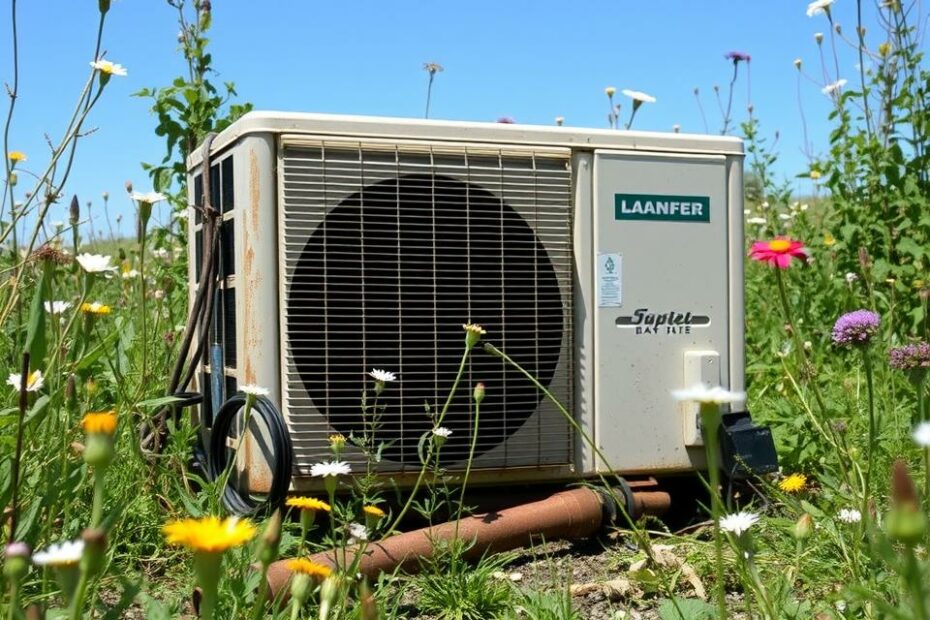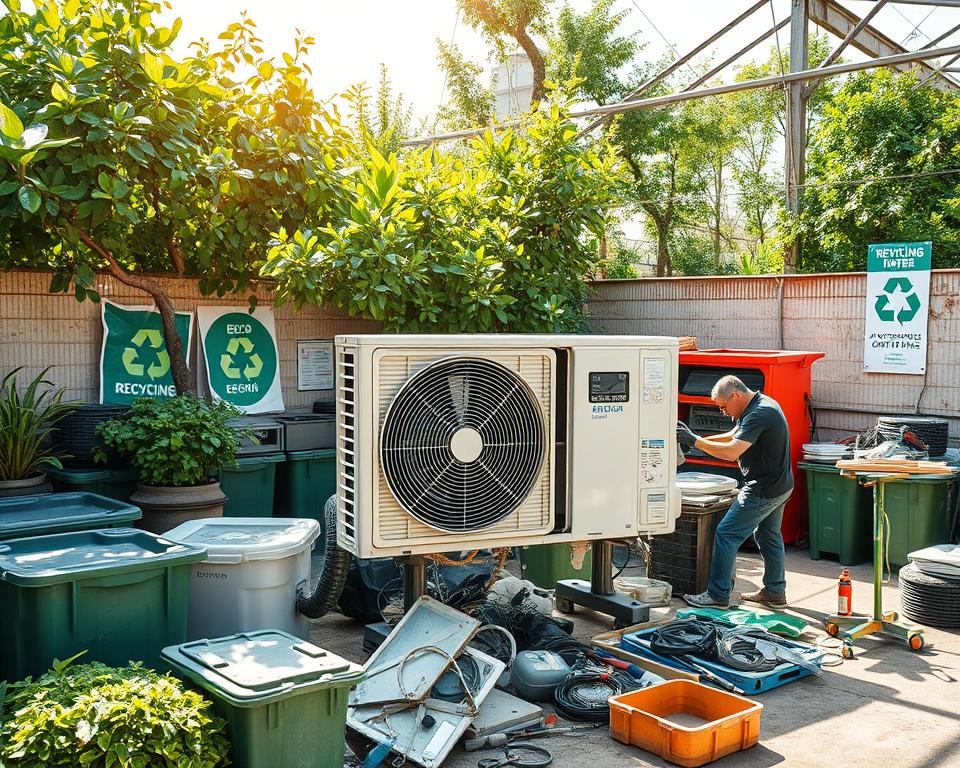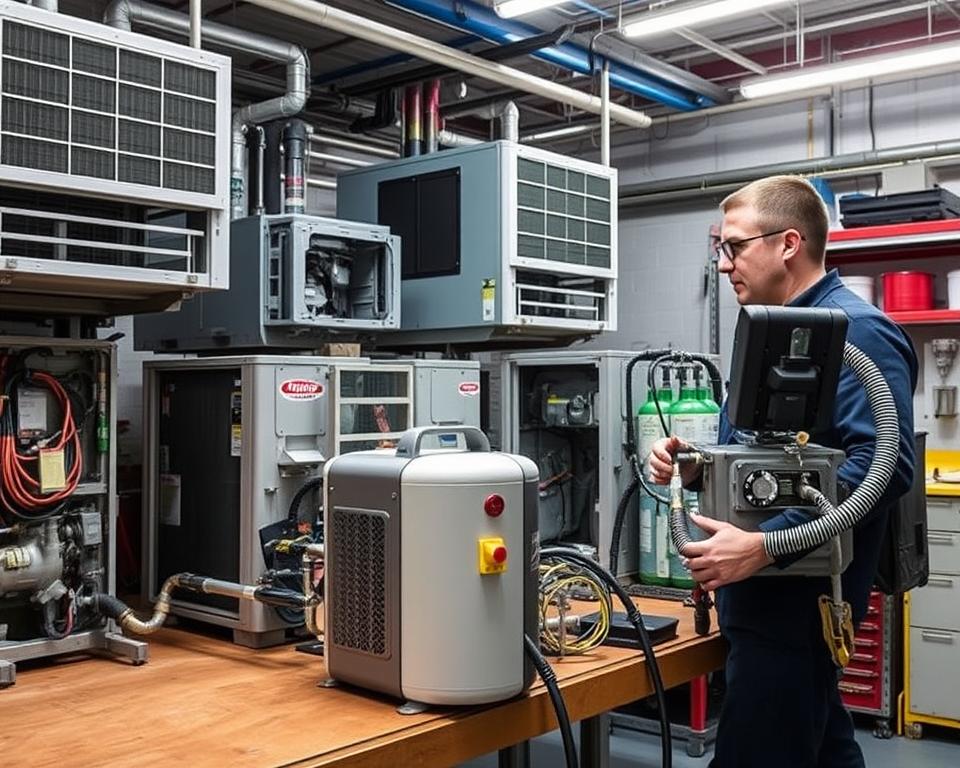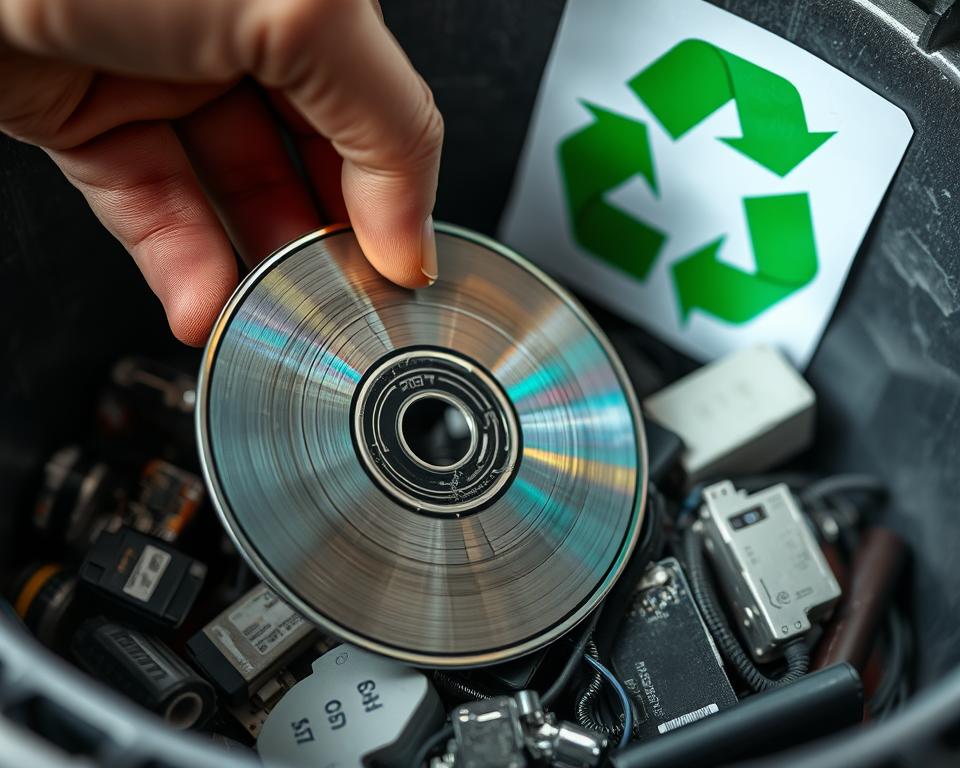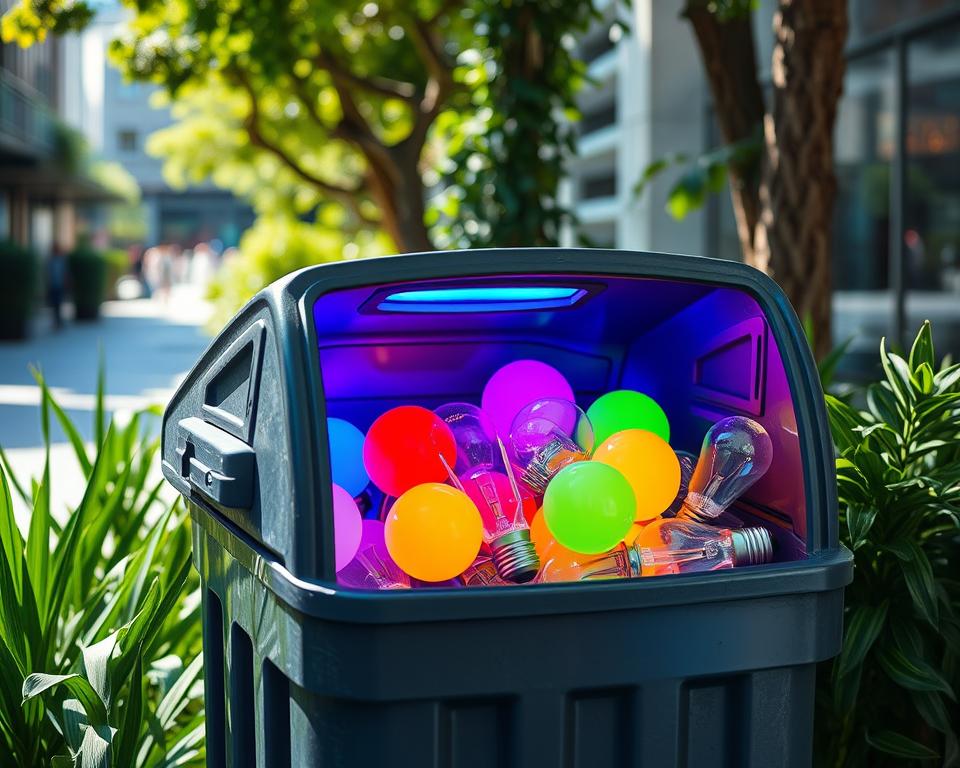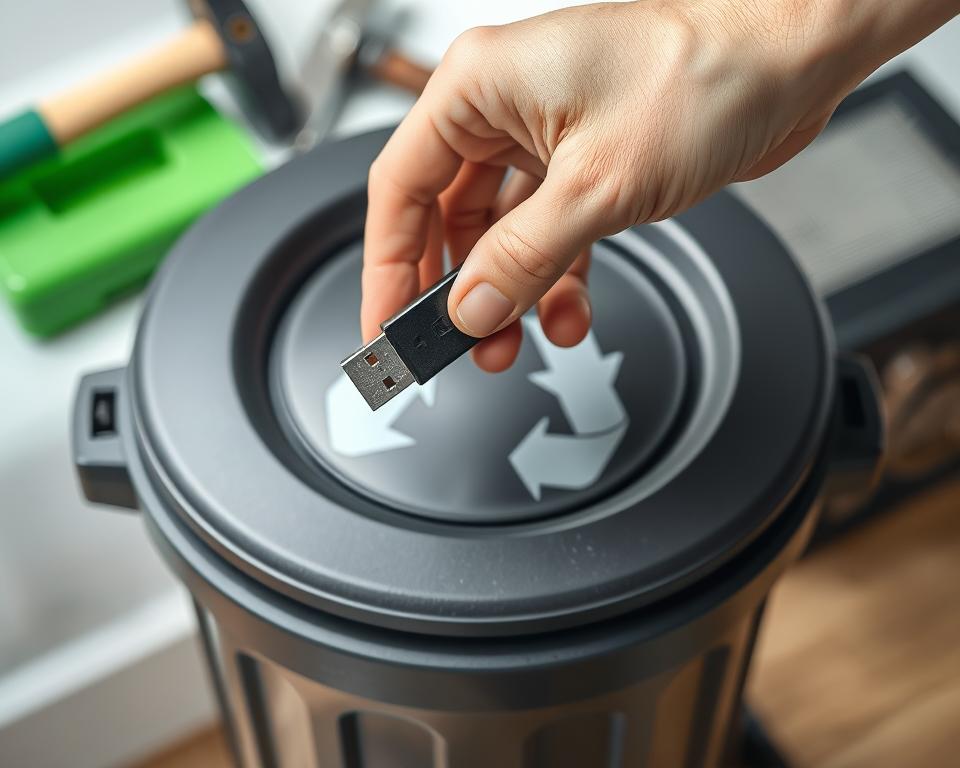Summer heat waves remind me of my old air conditioner’s hard work. It kept my home cool for years. Now, it’s time to say goodbye. But how do I dispose of it properly?
Don’t worry if you’re in the same situation. This guide will show you how to dispose of the air conditioner safely and responsibly. We’ll talk about the environmental impact and where to recycle or donate it. You’ll learn how to give your old air conditioner a proper farewell.
Key Takeaways
- Improper disposal of air conditioners can release harmful chemicals and greenhouse gases into the environment.
- Local sanitation programs, HVAC retailers, and bounty programs offer convenient disposal and recycling options.
- Donating or recycling old air conditioners can provide tax benefits and environmental advantages.
- Hiring professional junk removal services can simplify the disposal process, especially for larger units.
- Checking local regulations and guidelines is crucial to ensure you’re disposing of your air conditioner correctly.
Why Proper Air Conditioner Disposal Matters
Environmental Impact of Improper Disposal
Air conditioners have lots of materials like plastic, copper, and steel. But the biggest worry is the refrigerant. Older units have chlorofluorocarbons (CFCs), which harm the climate and ozone. Even newer ones with HCFC-22 or R410a are bad for the environment.
When air conditioners are not disposed of right, these harmful substances get released. This can pollute the air, soil, and water. So, managing HVAC waste is key to protecting our planet.
The environmental impact of improper end-of-life air conditioning units disposal is big. Older units with CFCs are especially bad because they damage the ozone layer. Newer ones might be less harmful but still pose risks if not disposed of correctly.
Releasing these substances can have serious effects on our environment. This shows why we need to dispose of air conditioners in an eco-friendly way.
Getting rid of air conditioners the right way is good for the planet and follows the law. If we don’t, we could face fines and legal trouble. So, it’s important for everyone to know how to dispose of old air conditioners properly.
Preparing Your Air Conditioner for Disposal
Before you can dispose of your old air conditioner, there are important steps to follow. First, remove any doors, covers, or hatches from the AC unit. This is key to keep children or small animals safe during disposal.
Next, have a professional drain the refrigerant or coolant from your air conditioner. Any tanks, tubes, or hoses with refrigerant must go to a hazardous waste center for safe disposal. This is because refrigerants harm the environment and contribute to climate change.
If you’re moving the old HVAC equipment disposal yourself, be careful. Avoid damaging any tubing or leaking coolant, as it’s dangerous.
Removing Doors and Draining Refrigerants
To get your air conditioner ready for proper AC unit disposal, follow these steps:
- Remove all doors, covers, and hatches from the AC unit.
- Have a licensed HVAC technician or appliance expert drain the refrigerant or coolant from the unit.
- Safely transport the drained refrigerant tanks to a hazardous waste collection center for refrigerant recovery.
- Carefully move the air conditioner without causing any damage to the tubing or coolant lines.
By following these steps, you can ensure your old air conditioner is disposed of responsibly and in an environmentally-friendly way.
Dispose of the air conditioner Through Local Programs
Getting rid of your old air conditioner is important. You should reach out to your city’s sanitation or recycling department. They can tell you about local programs for recycling and disposing of air conditioners. These services take care of everything, from removing the refrigerant to disposing of the unit.
In some places, you might need to schedule a pickup for bulky items and appliances. Others might ask you to drop off the air conditioner at a transfer station or landfill. Always check with your local government or waste management to know what’s required in your area.
- Contact your local sanitation or recycling department to inquire about air conditioner disposal programs
- Some cities require an appointment for bulky waste and appliance collection
- Others may direct you to take the air conditioner to a transfer station or landfill
- Verify the specific regulations and procedures with your local authorities or a waste management contractor
Using local programs to dispose of your old air conditioner is a good choice. It ensures harmful chemicals and materials are handled safely. This helps protect the environment and follows all laws and regulations.
Recycling and Donation Options
There are many ways to get rid of your old air conditioner responsibly. If it still works, consider donating it to schools, charities, or community centers. They might really need a working air conditioner.
Appliance stores and energy companies might give you money back for recycling your air conditioners. They take care of recycling and make sure it’s done right. But, don’t donate old air conditioners with R-22 refrigerants because they harm the environment.
Some junk removal companies also donate to charities. They help remove your air conditioner and make sure it’s recycled or donated. This is a great option if you need help getting rid of it.
Responsible Appliance Recycling Programs
- The EPA’s Responsible Appliance Disposal (RAD) program has 77 facilities across 32 states dedicated to the proper recycling of air conditioners and other appliances.
- Energy companies may offer bounty programs, providing rebates or bill credits for recycling air conditioners through their services.
- Some appliance retailers offer pickup and disposal services when you purchase a new air conditioning unit, potentially with discounts or cash offers.
Looking into recycling and donation options helps your old air conditioning unit have a positive impact. It reduces waste and helps those in need. Always check local programs and rules to find the best way to recycle or donate your air conditioner.
Hiring Professional Junk Removal Services
If getting rid of your old air conditioner feels too hard, consider hiring professionals. Companies like LoadUp offer quick, simple, and cheap air conditioner removal and disposal in over 170 cities. They make it easy for you.
These experts work hard to donate or recycle items that can be reused. They dispose of the rest in a way that’s good for the environment. This makes air conditioner disposal, HVAC equipment disposal, and proper AC unit disposal hassle-free.
Junk removal companies can handle many bulky items, like old appliances and furniture. They also deal with electronic waste and construction debris. Their teams have the right tools and know-how to safely remove and transport your unwanted air conditioner. They make sure it’s disposed of right, following local rules.
Using professional junk removal services saves you time and effort. They take care of picking up, transporting, and disposing of your old air conditioner. This lets you focus on other things while they handle the hard work and eco-friendly disposal.
Refrigerant Recovery and Recycling
The Importance of Proper Refrigerant Handling
Air conditioners have harmful refrigerants that need careful handling. The Environmental Protection Agency says it’s illegal to throw away air conditioners without getting the refrigerants back. Anyone can do this, not just HVAC experts.
This is important to stop harmful substances from getting into the air. It helps prevent damage to our planet’s climate.
In California, many car owners add refrigerant to their AC systems. They buy r134a refrigerant from auto stores. Stores ask for a $10 deposit on these cans.
People can return the cans to the store or any other place selling them. In Southern California, there’s a recycling center in Baldwin Park. It’s run by Refrigerant Handling, Inc.
| Refrigerant Type | Impact on Ozone Layer | Global Warming Potential |
|---|---|---|
| Chlorofluorocarbons (CFCs) – R-12 | Harmful | High |
| Hydrochlorofluorocarbons (HCFCs) – R-22 | Harmful | Moderate |
| Hydrofluorocarbons (HFCs) – R-134a, R-410A | No ozone impact | High |
| Hydrofluoroolefins (HFOs) | No ozone impact | Low |
| Natural Refrigerants (CO2, Hydrocarbons) | No ozone impact | Very low |
There’s a big push for safer refrigerants like hydrofluoroolefins (HFOs) and natural ones. Leaked refrigerants can harm people’s health. It’s key to recycle refrigerants to protect our environment and health.
Air Conditioner Disposal for HVAC Professionals
As HVAC professionals, you have a big role in getting rid of old air conditioning units. The Clean Air Act says you must get back all refrigerants when getting rid of these units. Keeping detailed records is not just a legal must, but it can also help you make money by selling the refrigerant.
It’s your job to make sure central units, mini-splits, and other air conditioners are disposed of properly. Since 1989, 1-800-GOT-JUNK? has been leading in HVAC equipment disposal and HVAC waste management. They offer a single price for getting rid of any air conditioner, making it easy for clients.
| Key Statistic | Value |
|---|---|
| Percentage of U.S. households with air conditioning | 88% |
| Percentage of old air conditioners that can be refurbished | Unknown |
| Percentage of air conditioners manufactured before 2010 using R-22 refrigerant | Unknown |
When taking out window or wall-mounted air conditioning units, safety is key. Make sure to disconnect attachments carefully. For big central air systems, you might need a pro for removal and disposal.
1-800-GOT-JUNK? works with local charities to give old air conditioners a new life. They focus on safe end-of-life air conditioning units disposal because of the harmful chemicals inside, like refrigerants that harm the ozone layer if not disposed of right.
HVAC pros are crucial in managing HVAC waste. They make sure old air conditioning units are disposed of in a green way. By following rules, getting back refrigerants, and working with trusted services, you help the HVAC industry be more eco-friendly.
Responsible Appliance Recycling Programs
Disposing of your old air conditioner can be a big deal. Responsible appliance recycling programs help a lot. The EPA’s RAD program works with companies across the U.S. to recycle air conditioners in a green way.
There are 77 facilities in 32 states for RAD. These places have the right tools and people to handle your old unit safely. Recycling your air conditioner responsibly means it’s treated well for the planet.
Local utility companies also have recycling programs. They might give you rebates or discounts for recycling your old air conditioner or fridge. Check with your utility provider to see what they offer for end-of-life air conditioning units.
| Appliance Type | Rebate Amount |
|---|---|
| Refrigerator | $50 |
| Freezer | $50 |
| Room Air Conditioner | $15 |
| Dehumidifier | $15 |
Using these recycling programs means your old air conditioner is recycled the right way. It helps make the future greener.
Local Regulations and Guidelines
Before getting rid of your old air conditioner, check with your local authorities. They can tell you about any rules and regulations in your area. Some places have special ways to dispose of air conditioners and other appliances with refrigerants. You might need to make an appointment or go to a specific drop-off location.
It’s best to contact your local sanitation or recycling department. They can help you make sure you’re getting rid of your air conditioner the right way. This way, you’ll follow the air conditioner disposal laws in your area.
Checking Municipal and State Rules
Getting rid of air conditioners the right way is important for the environment. Many places have laws against throwing them away in landfills. This is because they contain harmful gases, chemicals, and heavy metals.
Talking to your local authorities can give you important information. They can tell you about the local regulations and guidelines for disposing of your old air conditioner.
- Understand any specific requirements or procedures for air conditioner disposal in your area.
- Identify designated drop-off locations or schedules for proper disposal of air conditioning units.
- Learn about any financial incentives or rebate programs offered for responsibly recycling your old air conditioner.
By knowing and following the right local regulations, you can help the environment. This makes your community healthier and helps create a more sustainable future.
| Key Considerations | Relevant Regulations |
|---|---|
| Proper handling of refrigerants | EPA and state-level requirements for refrigerant recovery and disposal |
| Waste disposal methods | Municipal and county-level guidelines for appliance recycling and landfill restrictions |
| Recycling and recovery programs | Local utility or government-sponsored initiatives for air conditioner disposal and replacement |
Conclusion
Getting rid of your old air conditioner is key for the environment and following laws. You can work with your local sanitation, donate it, or use a junk removal service. These options help dispose of your air conditioner safely and eco-friendly.
Removing doors, draining refrigerants, and using recycling programs are important steps. They help lessen the harm of throwing away air conditioners. With more air conditioners around, it’s vital to recycle and dispose properly.
Proper disposal of your air conditioner is good for the planet and follows the law. Choosing to dispose of it right helps our planet’s future. It’s a step towards a greener world.
FAQ
What do I need to do before disposing of my old air conditioner?
Before getting rid of your air conditioner, take off any doors or covers. This keeps kids and pets safe. Also, have a pro drain the refrigerant to avoid spills.
How can I properly dispose of my old air conditioner?
Reach out to your local sanitation or recycling department. They’ll tell you about programs for old air conditioners. They can help with refrigerant removal and disposal.
Can I donate my old air conditioner if it’s still in good shape?
Yes, if your air conditioner works, consider donating it. Schools, charities, or community centers might need it. But, don’t donate old units with R-22 refrigerants.
Why is it important to properly dispose of an old air conditioner?
Air conditioners have harmful refrigerants. If not disposed of right, these can harm the ozone layer and cause climate change.
How can HVAC professionals properly dispose of old air conditioning units?
HVAC companies must handle refrigerants safely. They keep records for EPA certification and can sell the refrigerant to certified reclaimers.
What should I do if my local area has specific guidelines for disposing of air conditioners?
Always check with local authorities for disposal rules. Some places have special requirements for air conditioner disposal. Contacting your local sanitation or recycling department is best.
Source Links
- https://climateexperts.ca/where-to-take-old-air-conditioners-for-disposal-6-ideas/
- https://www.fenwickhomeservices.com/blog/step-by-step-guide-4-ways-to-recycle-your-old-air-conditioner/
- https://www.nytimes.com/wirecutter/blog/how-to-dispose-of-a-window-ac-unit/
- https://www.recycletechnologies.com/the-importance-of-air-conditioner-disposal-and-its-effects/
